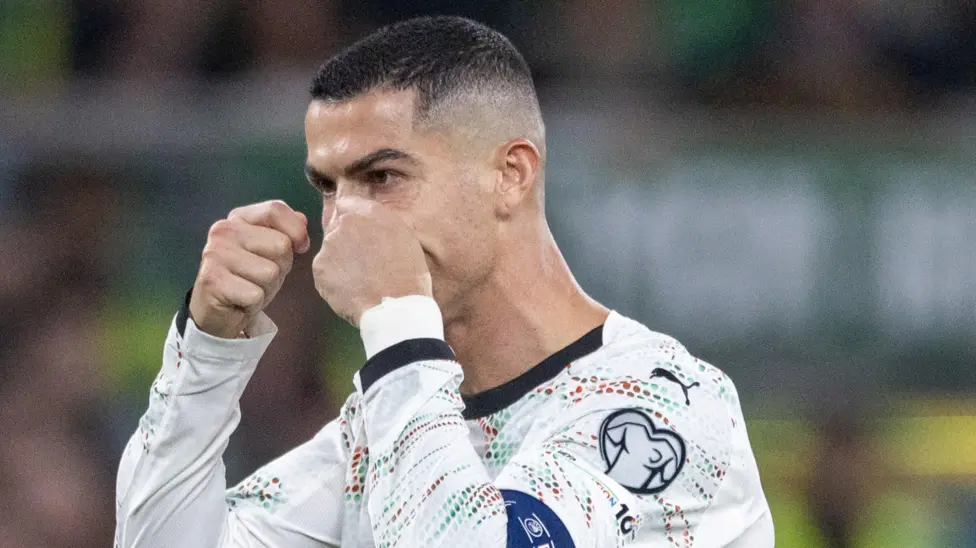Cristiano Ronaldo’s return to Dublin proved far more dramatic than anyone expected, as the Portugal captain was sent off during his side’s 2-0 World Cup qualifying defeat to the Republic of Ireland. What unfolded next ignited a war of words between managers, raised questions over Ronaldo’s temperament, and left Portugal awaiting a disciplinary verdict that could affect their World Cup campaign.
Before the match, Ronaldo had joked that he would “try to be a good boy” to avoid hostility from the Irish crowd. Yet by the hour mark, the 40-year-old had again cemented his place as a pantomime villain in Dublin. With Portugal trailing to a Troy Parrott first-half brace, Ronaldo clashed with defender Dara O’Shea inside the Irish box while jostling for a cross. The veteran forward extended his arm into O’Shea’s back, sending the Ipswich defender to the turf and prompting furious appeals from the Irish players and fans.
Referee Glenn Nyberg initially issued a yellow card, but VAR intervened. After reviewing the footage on the pitch-side monitor, the Swedish official upgraded the booking to a straight red. Ronaldo reacted with sarcasm, gesturing mock tears toward the crowd and exchanging heated words with Ireland manager Heimir Hallgrimsson before walking off.
Ronaldo, who had struggled to influence the game, now faces a ban that could disrupt his potential final World Cup next summer. According to FIFA’s disciplinary code, violent conduct involving elbowing could lead to a minimum three-match ban. Ronaldo is already suspended for Portugal’s final qualifier against Armenia, but a longer suspension could spill into the World Cup group stage.
Hallgrimsson later suggested he may have played a role in unsettling Ronaldo. The pair had been involved in subtle verbal exchanges before the match, with Ronaldo accusing the Irish coach of “mind games” for publicly warning referees not to be influenced by the Portuguese superstar. After the sending-off, Hallgrimsson claimed the incident was purely Ronaldo’s responsibility—but not without a cheeky hint.
“It was his action on the pitch that cost him the red card,” Hallgrimsson said. “It had nothing to do with me—unless I got into his head.”
He added that his touchline exchange with Ronaldo ended with a handshake, but he saw the elbow as “a moment of silliness” from the five-time Ballon d’Or winner.
Portugal manager Roberto Martinez, however, strongly defended his captain. Frustrated by Hallgrimsson’s pre-match comments, Martinez argued that Ronaldo’s dismissal was harsh and influenced by theatrics.
“He’s never been sent off in 226 games—that deserves credit,” Martinez said. “He was being grabbed, pulled, pushed for nearly an hour. I don’t think it’s an elbow; it’s more of a full-body movement. The camera angle makes it look worse.”
Martinez also criticised O’Shea’s reaction, suggesting the defender fell “dramatically,” and hinted that Hallgrimsson’s remarks about referees may have added pressure on the officials.
Beyond the managerial back-and-forth, the red card leaves Portugal in a precarious position. If Portugal qualify automatically, Ronaldo could miss their first two World Cup matches in North America next summer. If they fall into the playoffs, he would serve the suspension there instead. A FIFA disciplinary committee will determine the final punishment.
For Ireland, the night was triumphant. Parrott’s double gave them a famous victory, and Ronaldo’s meltdown added a layer of theatre to an already electric atmosphere at the Aviva Stadium.
For Ronaldo, what should have been a nostalgic return to Dublin—where he first played for Real Madrid in 2009—ended in frustration, controversy, and potential repercussions that could shape the twilight of his international career.



